Politics
Erdoğan, Trump underscore need to bolster NATO deterrence at summit
President Recep Tayyip Erdoğan and U.S. President Donald Trump on Tuesday underscored the importance of strengthening NATO’s deterrence as two of the alliance’s leading members, during a bilateral meeting on the sidelines of the NATO summit in The Hague.
Welcoming the recently brokered cease-fire between Israel and Iran, Erdoğan praised Trump’s efforts in facilitating the truce and expressed hope that it would be sustained. He underscored the urgent need to end the humanitarian crisis in Gaza and reaffirmed Türkiye’s readiness to engage in close dialogue for peaceful solutions to the ongoing conflict in Ukraine.
Both leaders also emphasized the importance of strengthening NATO’s deterrent power and reaffirmed their countries’ commitment as leading allies within the alliance.
The meeting came on the first day of the two-day NATO summit, which is being hosted by Dutch King Willem-Alexander and Queen Maxima and brings together more than 45 world leaders and dignitaries to address strategic risks facing the Euro-Atlantic region.
During the meeting, Erdoğan also highlighted the strong potential for cooperation between Türkiye and the United States, particularly in energy and investment. He emphasized that advancing defense industry ties would support the two countries’ shared goal of reaching a $100 billion bilateral trade volume.
Before flying to the Netherlands for a leaders’ summit of NATO, Erdoğan said they welcomed the cease-fire between Iran and Israel after days of reciprocal attacks. He underlined that diplomacy should be given a chance in the process.
Leaders of NATO’s 32 member states are gathering in The Hague on June 24-25 for the summit dominated by debates over increased defense spending and Ukraine’s membership bid.
Politics
Turkish govt ally calls for UN peacekeepers for Gaza
Devlet Bahçeli, the head of Türkiye’s Nationalist Movement Party (MHP) and an ally of the government, has called on the United Nations to deploy peacekeepers to the Gaza Strip against Israel’s ongoing massacres.
In a strongly worded statement, Bahçeli condemned Israel’s military campaign as a “barbaric blockade” that has left Gaza’s population facing hunger, thirst, shortages of medicine and “all kinds of despicable oppression.”
He accused Israeli Prime Minister Benjamin Netanyahu of pursuing a “genocidal” plan to occupy and annex Gaza, calling it “a despicable ambition that should shock the world.”
“It is now a matter of life and death for the U.N. to take immediate action, or at least show signs of vitality and to deal a blow to the ongoing massacre and the Zionist project in Gaza with a peacekeeping force,” Bahçeli said.
The MHP leader urged the international community to act “on political, military and moral grounds” to prevent further civilian deaths, warning that any delay would have “disastrous consequences.”
He also called on Muslim countries to respond to what he described as the “groaning voices of the victims and oppressed” and to fulfill their “Islamic and humanitarian responsibilities.”
Bahçeli voiced support for Hamas, describing it as waging “an honorable struggle” to defend its homeland “with legitimate and justified reasons,” and said such resistance should receive backing from sympathetic states and organizations.
He dismissed as “unacceptable” any discussion of Israeli conditions for ending the war, framing them as terms of “annihilation.”
He also rejected what he characterized as the world’s passivity in the face of the humanitarian catastrophe, where “the buried ones are not only lifeless bodies but also humanity and human heritage.”
Bahçeli said Türkiye’s protests against Israel’s actions were “just, honorable, legal and extremely accurate,” and framed Ankara as a moral actor with the historical heritage and strategic vision to play a leading role in securing justice for the Palestinian people.
“The ambition to swallow Gaza must be thwarted,” he said, adding that a U.N. peacekeeping mission was both a “human duty” and an urgent necessity.
Politics
AK Party ‘revolution’ in Turkish politics set to mark 24 years
The Justice and Development Party (AK Party) will celebrate its 24th anniversary on Thursday. Evolved from a modest gathering of the “Movement of the Virtuous,” the party boasts a streak of successive election victories in two decades. It is credited with transforming Türkiye in the first two decades of the 2000s, from education and health care to the arts, democracy, human rights, defense industry and energy.
Nowadays, the party, under the leadership of President Recep Tayyip Erdoğan, is working toward achieving the ambitious Century of Türkiye vision, a new set of reforms aimed at enhancing Türkiye’s standing in the world and improving the lives of the Turkish nation in all fields.
Erdoğan will attend the main celebratory event at the party’s headquarters in Ankara, which will coincide with a gathering of the party’s chairs for 81 provincial offices, and make a speech. The party plans to introduce a new roadmap for the future and discuss public outreach that was recently expanded with a new campaign to explain the terror-free Türkiye initiative to the population. It will also discuss the achievements in the past 24 years.
In his speech, Erdoğan is expected to unveil new reforms set to be introduced in 2026 and issue new messages regarding the terror-free Türkiye initiative.
During the celebrations, more than four mayors from other parties are expected to switch sides to the AK Party. Some media outlets reported that two lawmakers who recently parted ways with the Future Party (GP) may join the AK Party during the event, along with several surprise names from the main opposition Republican People’s Party (CHP).
Milestones
The AK Party’s governance has brought about significant changes for the better in Türkiye, following years of coalition governments and economic uncertainties.
Garnering votes of people who suffered during the dark period that led to the so-called “postmodern” coup of 1997, the party reinstated its rights. It allowed headscarves for university students in a bid for equality for all. The ban on headscarves for middle school students was also lifted in 2014. This equality in education later expanded into the public sector, and civil servants were allowed to wear a headscarf.
Universities also flourished under AK Party governments and their numbers reached 209 with the government’s promise to have at least one university in each of the 81 provinces. Another revolutionary move was the offer of free textbooks to primary and middle school students for the first time. The AK Party governments also significantly altered the education system by introducing a 12-year mandatory education system instead of the previous eight years.
Another revolution came in the form of natural gas. The AK Party governments successfully led efforts for energy independence and security, and the Fatih drillship made a major natural gas find off the shores of the northwestern province of Sakarya, paving the way for meeting the energy needs of 3 million households. This was complemented by the discovery of 75 billion cubic meters of natural gas in another reserve, also in the Black Sea. Another significant step toward energy independence was the discovery of oil in Gabar Mountain in the southeast, leading to daily production exceeding 78,000 barrels of oil.
In health care, AK Party governments introduced Türkiye to the concept of the “city hospital.” These massive complexes, which merge specialized hospitals and offer premium services free of charge, were first opened in 2017 in the central city of Yozgat and have since spread to other cities.
Under the AK Party rule, Türkiye ensured that the nation’s will governed the country and switched to an executive presidency system shortly after implementing a new presidential system, where the public elects the president. Also in this new era, the age limit for election into Parliament was lowered to 18.
The past 24 years have also witnessed significant developments elsewhere, including the introduction of the first mass-produced locally made vehicle, Togg, the first locally made satellite, IMECE and the launch of the first Turkish astronaut into space. In the defense industry, dependence on other countries reduced from 80% to 20% and Türkiye introduced
Politics
Terror-free Türkiye commission continues work, determines members
As part of the new process in Türkiye to achieve a terror-free country, the parliamentary commission leading the process will meet for the third time on Tuesday.
Parliament Speaker Numan Kurtulmuş on Monday has asked the Justice and Development Party (AK Party), the main opposition Republican People’s Party (CHP), and the Peoples’ Equality and Democracy Party (DEM Party), to name one additional member each instead of the Good Party (IP), which did not participate in the National Unity, Fraternity and Democracy Committee. After the IP group announced its decision not to join the committee, a gap of three members emerged.
At the meeting, which will take place at 2 p.m., groups will submit proposals regarding the agenda. Commission chair Kurtulmuş will also share his own proposals with members. Deputies will also bring forward any individuals they would like the commission to hear from.
The committee, comprised of 48 lawmakers from most parties represented at Parliament, will weigh how the terror-free Türkiye initiative will proceed, especially in terms of laws and regulations regarding the status of the PKK terrorist group and its members. This may include lenient sentences for surrendering members of the group.
Although Parliament is in summer recess, the committee will continue to work without interruption. Kurtulmuş will serve as chairperson but is not eligible to vote in the committee’s voting processes. AK Party’s committee members include former Justice Minister Abdülhamit Gül. CHP’s committee members will consist of deputy parliamentary group chair Murat Emir, Deputy Chairs Gökçe Gökçen and Murat Bakan, and lawmakers from Istanbul, Diyarbakır, Ankara and Muğla. Among them are Türkan Elçi, the widow of Diyarbakır Bar Association’s former Chair Tahir Elçi, who died in 2015 in crossfire during a shootout between police officers and PKK members, and Sezgin Tanrıkulu, a prominent parliamentarian who has often made headlines for his heavy criticism of counterterrorism efforts.
The committee will not directly propose bills but will likely refer its reports to other subcommittees of Parliament, which will then discuss and vote on bills for their referral to the Parliament’s General Assembly. The General Assembly is the ultimate authority in Parliament to pass laws. Throughout its tenure, the committee will also hear statements of stakeholders involved or affected by the initiative, from the National Intelligence Organization (MIT), which monitors the PKK’s disarmament, to families of terror victims. The committee is expected to recommend amendments in counterterrorism laws and the Turkish Penal Code to accommodate the needs of the initiative, especially in terms of the situation of people convicted of terrorism or aiding and abetting the PKK.
‘Work to end by 2026’
Nationalist Movement Party (MHP) Chair Devlet Bahçeli on Sunday said that he expected all work regarding the terror-free Türkiye process would be completed by the end of the year.
According to a statement by Gülseven Media Group, with the representatives of which Bahçeli met, Bahçeli called on all political parties to support the works of the committee.
Saying that the PKK is acting in accordance with the organization’s jailed ringleader, Abdullah Öcalan’s call to dissolve opens the door for positive developments, Bahçeli added that the MHP is sincerely continuing their efforts to embody a climate of peace.
He said that the Kurdish population in Türkiye’s eastern and southeastern regions also supported the process and that this would ensure success.
Bahçeli emphasized that it is time for citizens everywhere to live in peace without the worry of terrorism.
The terror-free Türkiye initiative launched by Bahçeli had its first tangible progress in February when Öcalan accepted Bahçeli’s call and urged the group to lay down its weapons. In May, the PKK announced it would dissolve itself. Last month, some 30 PKK members, including a senior leader, burned their weapons in a ceremony in northern Iraq. Although symbolic, the gesture marked the first time that the group had laid down arms in its campaign of violence for more than four decades.
Politics
Azerbaijan, Armenia share text of peace deal signed in Washington
Azerbaijan and Armenia on Monday released the full text of their peace agreement, signed Friday during a U.S.-brokered trilateral summit in Washington.
According to the 17-point document shared by their foreign ministries, both countries recognized the borders of the Azerbaijani and Armenian republics in the Soviet Union as the boundary between the two states.
Both Baku and Yerevan confirmed that they do not have any territorial claims against one another and will not raise such claims in the future, the document noted.
It said that the two sides will refrain from using or threatening to use force against each other’s territorial integrity or political independence, and from interfering in each other’s internal affairs.
It further said that both countries will establish diplomatic ties once they exchange “instruments of ratification,” and conduct negotiations to delimit and demarcate their border.
Armenia and Azerbaijan agreed not to deploy any third-party forces along their border, it added.
The document also said both countries agreed to establish a bilateral commission to oversee the implementation of the peace deal, and withdraw mutual claims in international courts within a month after the deal enters into force, among other matters.
“The present Agreement is concluded in the Azerbaijani, Armenian, and English languages, with all three texts being equally authentic. In case of divergence as to the meaning of a provision under any of the authentic texts, the English text shall prevail,” it added.
The peace agreement between the two countries was signed on Friday by their foreign ministers amid a trilateral summit between Azerbaijani President Ilham Aliyev, U.S. President Donald Trump, and Armenian Prime Minister Nikol Pashinyan at the White House, formally ending over three decades of conflict.
Armenia and Azerbaijan have fought a series of cross-border wars since the late 1980s, including most recently in 2023, when Azerbaijan liberated its territory of Karabakh.
Politics
Erdoğan marks 11 years in power as first publicly elected president
A constitutional amendment that ended the largely ceremonial role of the president boosted President Recep Tayyip Erdoğan’s place in the annals of Turkish democracy. The charismatic leader whose party has won successive elections since 2002 marks 11 years in power on Sunday, as the first president directly voted into office by the nation.
During Erdoğan’s tenure as democratically elected president, Türkiye has weathered several crises and raised its diplomatic profile as a significant power broker and a force to reckon with, from mediating crises between Ethiopia and Somalia to the conflict between Russia and Ukraine and giving a powerful voice to Türkiye against Israel’s attacks on Gaza. At home, Erdoğan mobilized the nation and steered the recovery after the “disaster of the century” or earthquakes that killed tens of thousands of people in southern Türkiye in February 2023. Most recently, the People’s Alliance under the leadership of Erdoğan embarked upon an ambitious plan to disarm the PKK and end decades of violence by the terrorist group.
It was a rough path for Erdoğan, who himself and his party faced numerous challenges over the past two decades, but ultimately, the public’s will for true democracy won. Erdoğan had to wait seven years for the first direct presidential election, following a 2007 amendment that changed the election rules and was approved by a public referendum. Before the amendment, the presidency was a ceremonial role and Parliament elected the president. Opposition parties initially opposed the arrangement, but when the election date neared, they fielded their own candidates one after another. Erdoğan, the candidate of his Justice and Development Party (AK Party), was challenged by former Organisation of Islamic Cooperation (OIC) Secretary-General Ekmeleddin Ihsanoğlu, who was supported by the majority of opposition parties, and Selahattin Demirtaş, co-chair of the now-defunct Peoples’ Democratic Party (HDP).
Erdoğan secured more than 51.7% of the vote, becoming the 12th and first directly elected president of the Republic of Türkiye. Three years later, he won another victory for further changes to the presidential system, when more than 51% of the voters approved the executive presidency system, granting more powers to the president in a 2017 referendum. In 2018, another presidential vote was held, this time pitting Erdoğan against more challengers, but the veteran politician managed to beat his rivals again. His last election was in 2023 and Erdoğan etched his name in the annals of Turkish democracy again by defeating Kemal Kılıçdaroğlu, the joint candidate of a six-party opposition bloc, although this time in a runoff vote.
In a social media post on Sunday, AK Party’s deputy chair, Efkan Ala, marked the day and said the era of running Türkiye “without public consent” was “over.” “The irade is now idare,” he said, using Turkish words for “will” and “administration” respectively.
The presidency in its original form was a powerful authority, as evidenced during the tenure of Mustafa Kemal Atatürk, the country’s first president and founder of the Republic of Türkiye. His successor, Ismet Inönü, was branded as “National Chief” for his immense power that even continued when his Republican People’s Party (CHP) was in opposition. But after the 1960 coup that ousted President Celal Bayar from power, it became a mere symbol of “authority” without any real power, while the post of prime minister evolved into the actual seat of governance. The post only had its influence when former army chief Kenan Evren launched a coup in 1980 and installed himself as president. Before and after that coup, prime ministers and presidents rarely aligned, and this separation was most evident during the tenure of Ahmet Necdet Sezer, who infamously clashed with then-Prime Minister Bülent Ecevit in 2001 during a National Security Council meeting, paving the way for an economic crisis.
Ala said Erdoğan’s election was a turning point in Turkish history, marking a revolution that eliminated the shadow of “tutelage.” He was referring to the influence of a political and military elite that had threatened with a coup and occasionally succeeded in launching it in the past, whenever they felt their interests were threatened.
“This reform led by the AK Party strengthened national sovereignty, reinforced democratic representation and put the nation’s approval at the heart of politics. Decisions, authority and responsibility now are being shaped directly by the will of they people,” Ala said.
“National will is the strongest foundation. This step ensured that Türkiye continues its path stronger and decisively. We turned the page on the crisis stemming from the presidential elections,” he said.
Politics
Armenia eyes Türkiye deal after historic peace talks with Azerbaijan
Armenia and Azerbaijan’s move for a permanent peace raises hope for a normalization between Türkiye and Armenia.
Armenia’s deputy foreign minister described an “historic” trilateral summit with Azerbaijan and the U.S. at the White House as a turning point in Armenia-Azerbaijan normalization while creating an “important milestone” for same with Türkiye.
Vahan Kostanyan told Anadolu Agency (AA) on Saturday that the meetings marked “an important milestone,” one day after Armenian Prime Minister Nikol Pashinyan, Azerbaijani President Ilham Aliyev and U.S. President Donald Trump signed an agreement at the White House to end decades of conflict.
“Yesterday’s discussions, both bilaterally with the United States and trilaterally with the United States and Azerbaijan, were very important, even historic,” said Kostanyan. “We registered an important milestone when it comes to Armenia-Azerbaijan normalization, but also strengthening of the Armenia-U.S. sttrategic partnership.
He noted three key memoranda of understanding were signed between Armenia and the U.S., on capacity building for Armenia’s Crossroads of Peace project, cooperation in artificial intelligence and semiconductors, and on energy.
On the Armenia-Azerbaijan agreement, he highlighted that the peace treaty agreed in March had now been initialed. They also signed a letter on the dissolution of the OSCE Minsk Group, and the joint declaration witnessed by Trump.
Kostanyan praised previous statements by President Recep Tayyip Erdoğan that encouraged Armenia and Azerbaijan to conclude a peace treaty, saying they had “positively” affected normalization talks.
“With yesterday’s event, we see an important milestone and opportunity that we can achieve with Türkiye as well,” he said. “This connectivity project can be feasible and can be much more regionally and globally important if we call communications between Armenia and Turkey are relaunched as well.”
He expressed hope that Ankara would “reciprocate the goodwill of the government of Armenia” by opening the Turkish-Armenian border and establishing diplomatic relations.
“We can achieve another very important milestone for the stability and economic prosperity in our region, meaning that we’ll be able to open the border between Armenia and Türkiye and establish diplomatic relations,” he added.
After the collapse of the Soviet Union, Türkiye was among the first countries to recognize Armenia’s independence on Sept. 21, 1991, but closed its border and severed diplomatic ties in 1993 following Armenia’s occupation of Karabakh. Relations began to thaw after the 2020 Karabakh war, with both sides appointing special envoys to pursue normalization talks.
Türkiye on Friday welcomed progress toward establishing lasting peace between Azerbaijan and Armenia, following a declaration recorded in Washington on Aug. 8.
In a statement, the Foreign Ministry said the step comes at a time of intensifying global conflicts and crises, describing it as a highly significant development for ensuring regional peace and stability.
Ankara expressed appreciation for the contribution of the U.S. administration to the process and said a “historic opportunity” has emerged for achieving peace and prosperity in the South Caucasus.
“As Türkiye, we will continue to contribute to efforts aimed at seizing this opportunity and will support the devoted efforts of our dear Azerbaijan,” the ministry said.
The two countries share a complex history. Armenia for a long time accused Türkiye or rather, the Ottoman Empire, of committing genocide against Armenian population in the country during World War I. Türkiye has repeatedly denied the claims of genocide although it acknowledged high number of deaths among Armenians due to isolated incidents and diseases.
The Second Karabakh War, which ended in 2020, reignited hopes for renewed dialogue. In 2021, Ankara and Yerevan appointed special representatives tasked with normalizing relations and negotiating the reopening of their land border. So far, limited agreements have allowed third-country citizens and diplomats to cross, but a full reopening remains elusive.
Despite these hurdles, there have been tentative gestures toward cooperation. The Margara border crossing has been used twice in recent years for humanitarian purposes: in February 2023 to deliver Armenian aid trucks following a devastating earthquake in southeastern Türkiye, and in March 2024 for humanitarian aid shipments to Syria via Türkiye. Armenia has also upgraded the crossing in anticipation of future use.
In June, Pashinyan visited Türkiye and met President Recep Tayyip Erdoğan in a historic but somewhat muted visit. Two leaders expressed readiness for peace in their region and commitment to normalization of ties.
One of the key components of Friday’s agreement at the White House summit is the development of what is being called the Trump Route for International Peace and Prosperity (TRIPP), which will connect mainland Azerbaijan and its Nakhchivan Autonomous Republic exclave.
Kostanyan said the declaration envisions opening regional transportation and communication routes under the sovereignty, jurisdiction and territorial integrity of the states they traverse.
He explained that the project will be developed by Armenia and the U.S. on Armenian territory, enabling regional communications, including a link from southern Armenia through Nakhchivan to other parts of the country.
While the founding principles have been agreed, Kostanyan said technical and working-level discussions on the project’s modalities will follow.
-
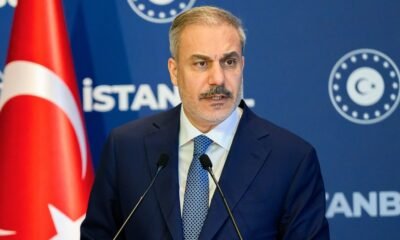
 Politics3 days ago
Politics3 days agoTurkish FM Fidan to visit Egypt to discuss Israel’s Gaza plan
-
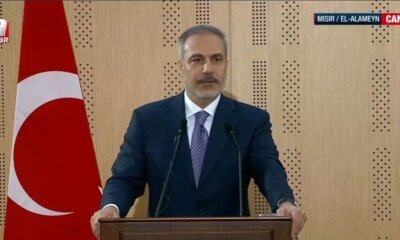
 Daily Agenda3 days ago
Daily Agenda3 days agoForeign Minister Fidan: Israel persistently sabotes cease -fire initiatives
-
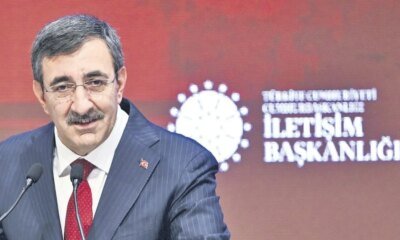
 Daily Agenda3 days ago
Daily Agenda3 days agoVice President Yılmaz: To create a chaos environment for their purpose
-
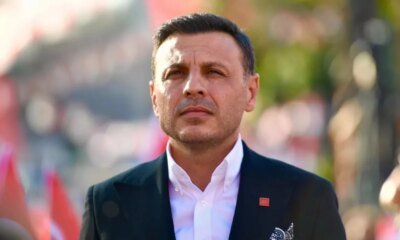
 Daily Agenda3 days ago
Daily Agenda3 days agoLawyer Mehmet Yıldırım and CHP Provincial Chairman Özgür Çelik Came Out
-
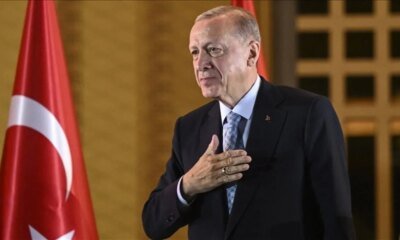
 Daily Agenda3 days ago
Daily Agenda3 days agoThe first President Erdoğan chosen by the public completed 11 years in office
-
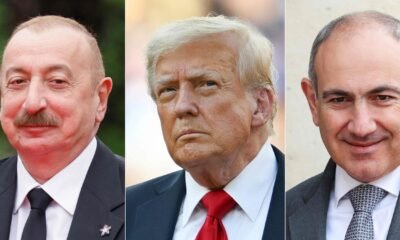
 Politics3 days ago
Politics3 days agoTrump to host Azerbaijan, Armenia to sign US-brokered peace deal
-
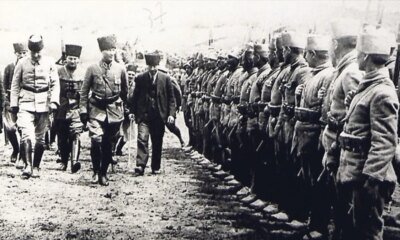
 Daily Agenda1 day ago
Daily Agenda1 day agoVictories Month August – Breaking News
-
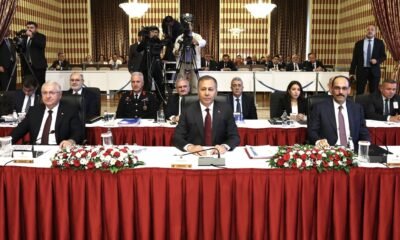
 Politics22 hours ago
Politics22 hours agoTerror-free Türkiye plan proceeds with caution, focus on PKK’s future




